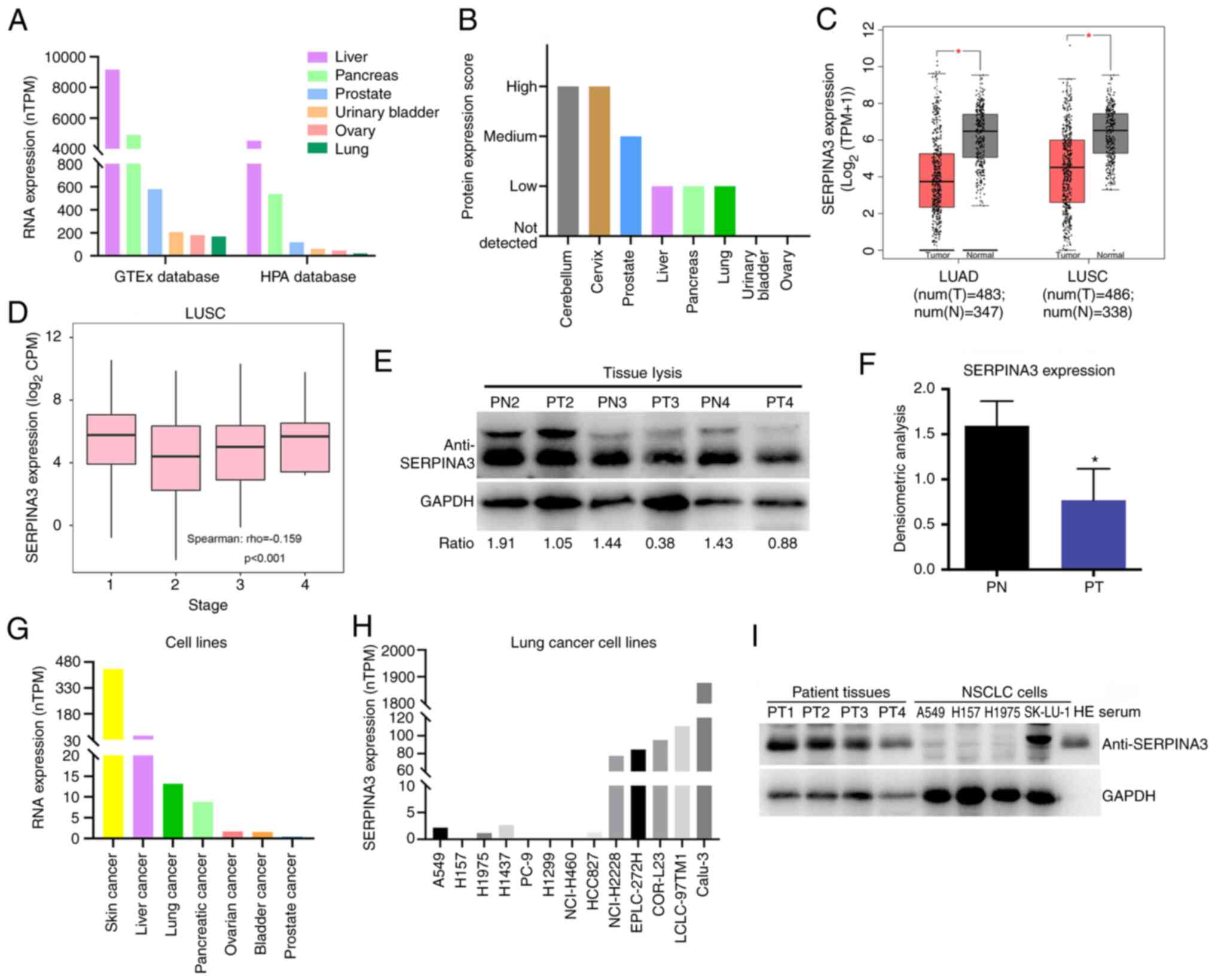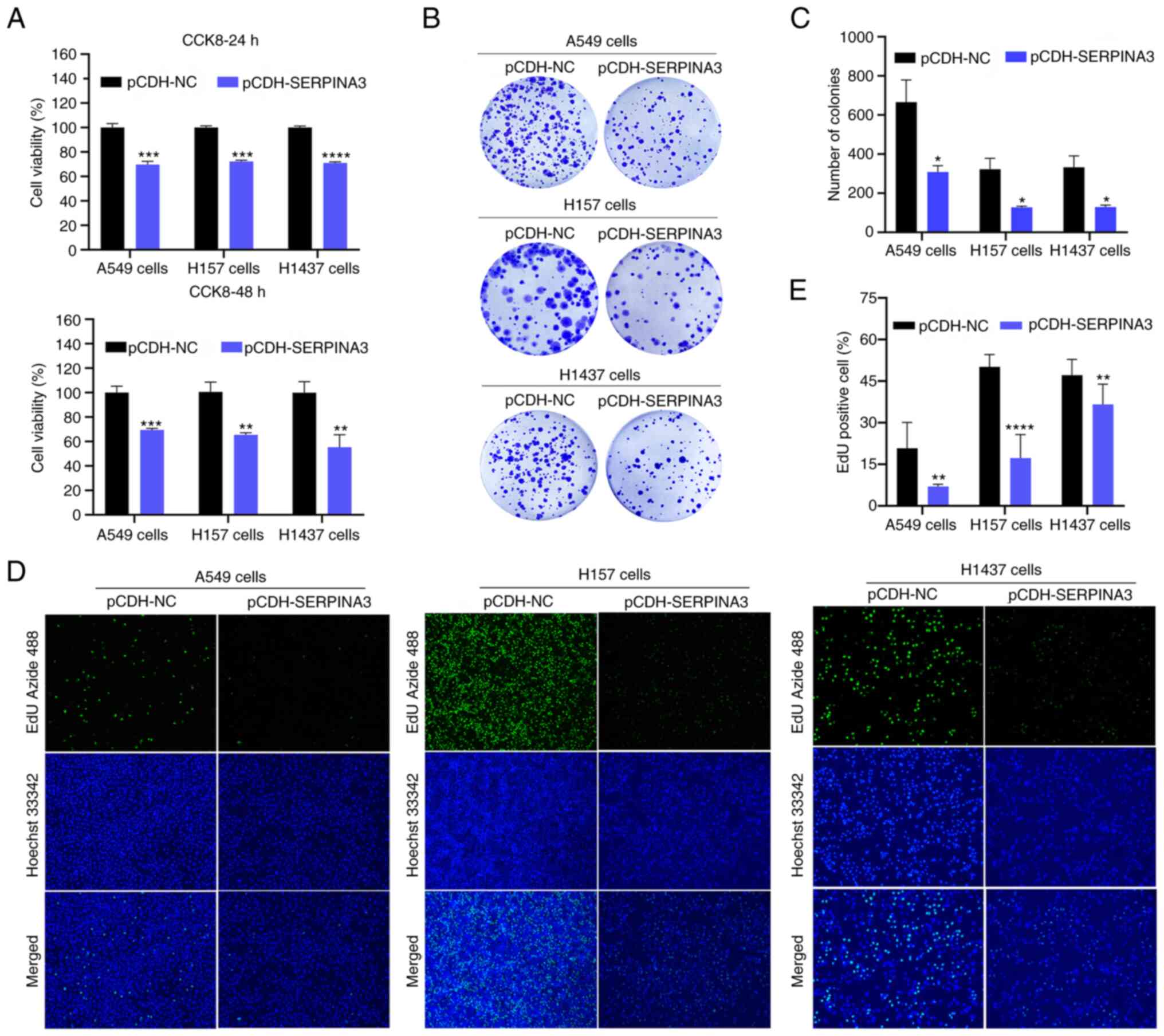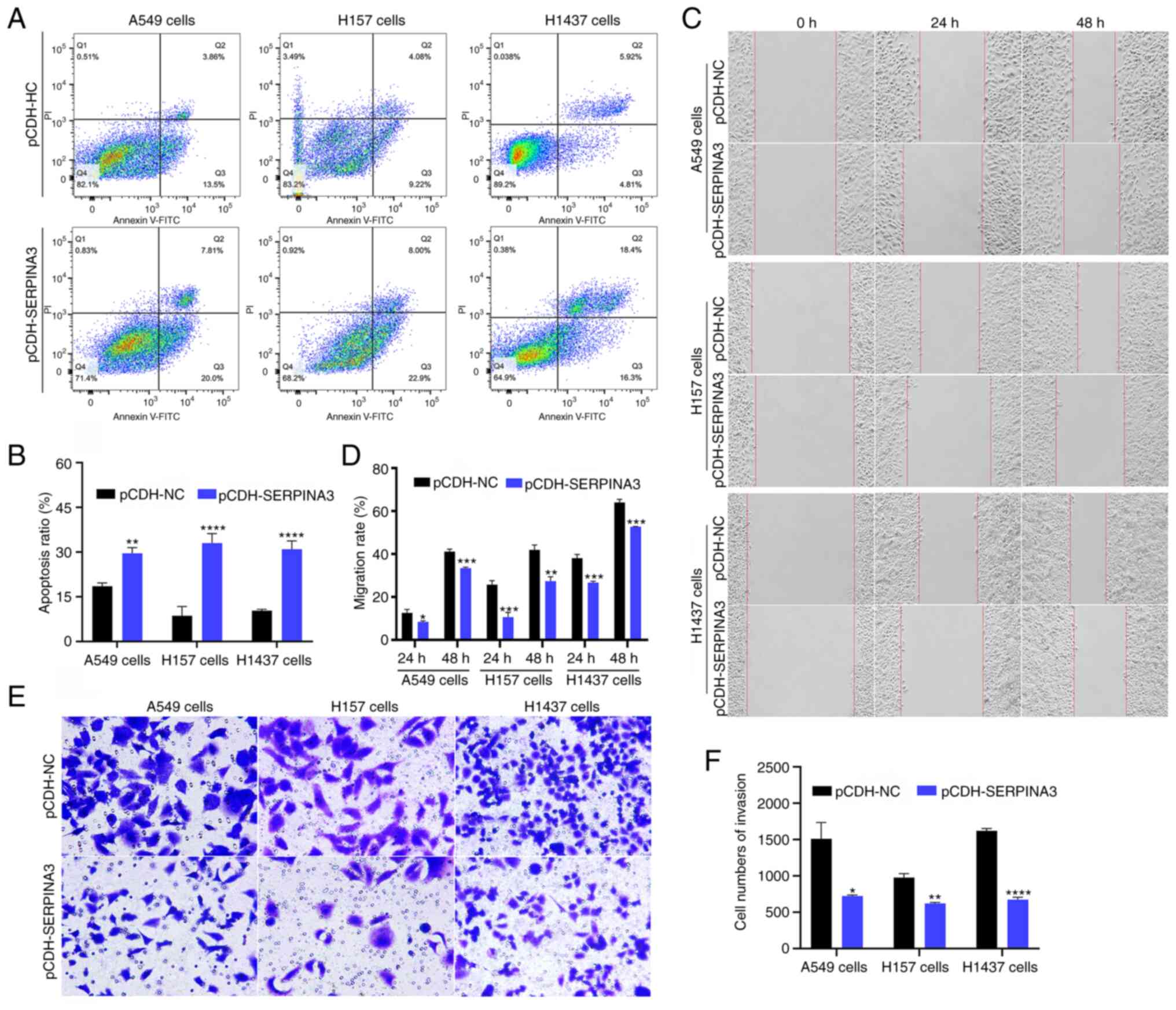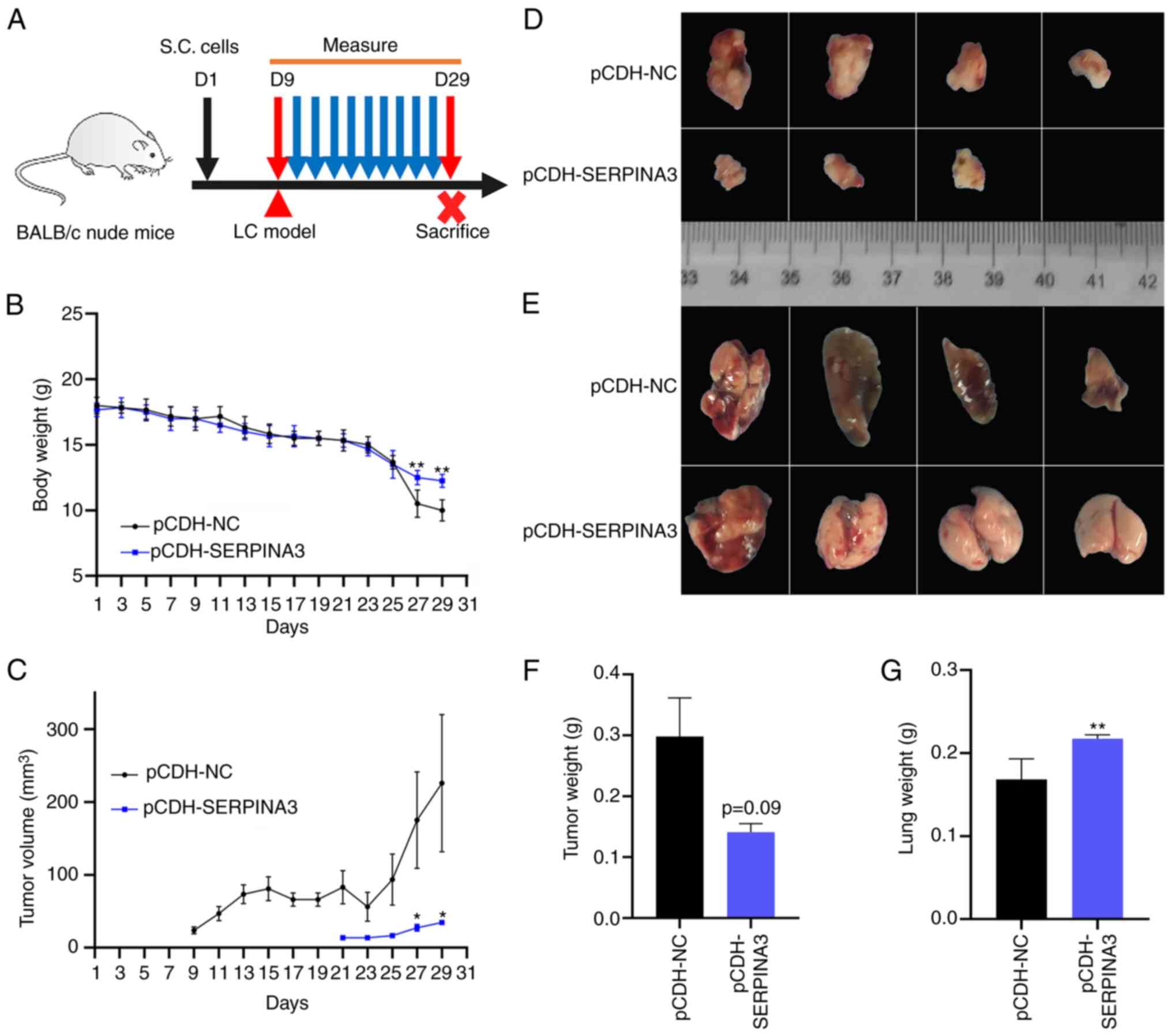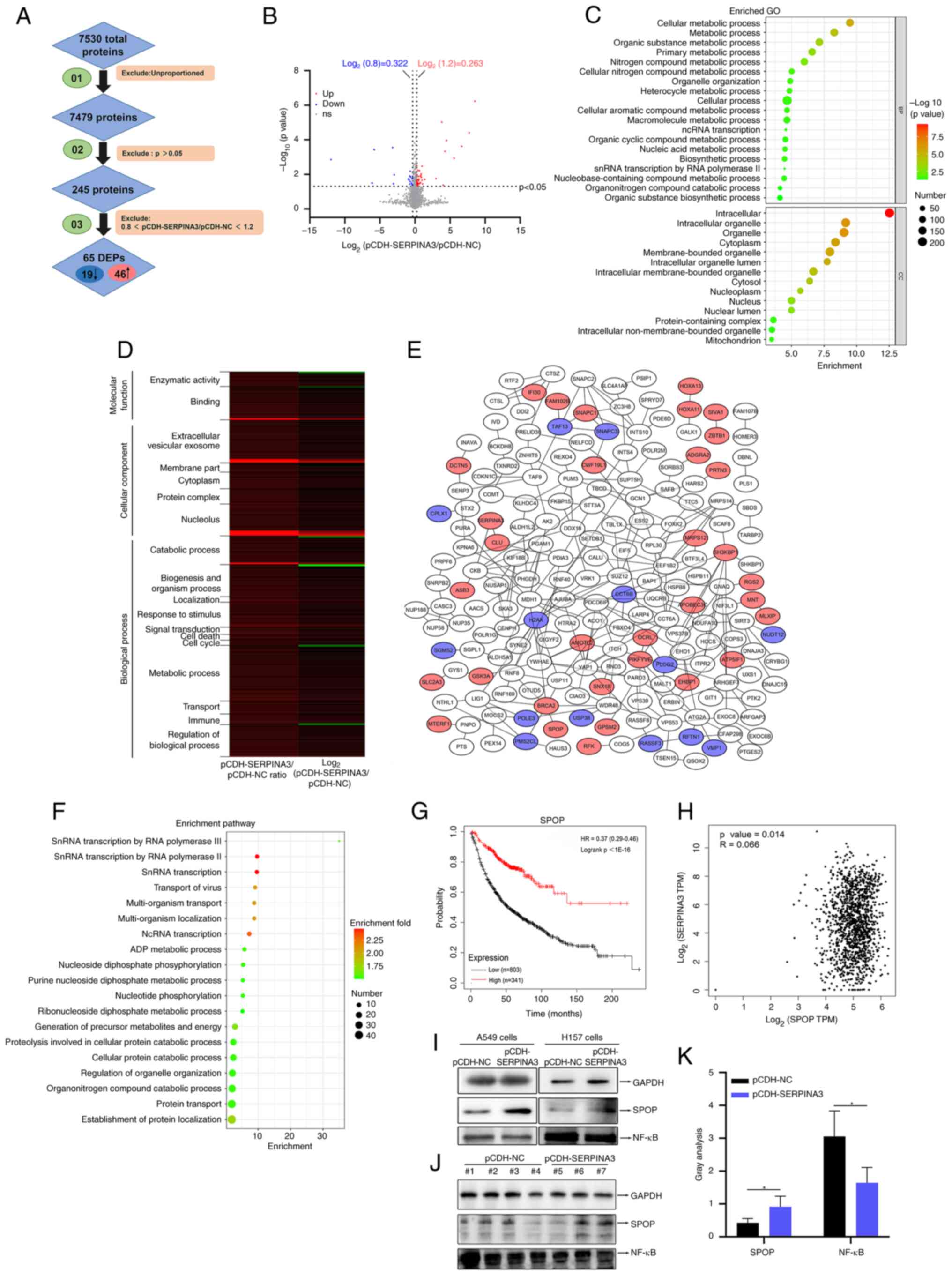|
1
|
Sung H, Ferlay J, Siegel RL, Laversanne M,
Soerjomataram I, Jemal A and Bray F: Global cancer statistics 2020:
GLOBOCAN estimates of incidence and mortality worldwide for 36
cancers in 185 countries. CA Cancer J Clin. 71:209–249. 2021.
View Article : Google Scholar : PubMed/NCBI
|
|
2
|
Howlader N, Forjaz G, Mooradian MJ, Meza
R, Kong CY, Cronin KA, Mariotto AB, Lowy DR and Feuer EJ: The
effect of advances in lung-cancer treatment on population
mortality. N Engl J Med. 383:640–649. 2020. View Article : Google Scholar : PubMed/NCBI
|
|
3
|
Kleczko EK, Kwak JW, Schenk EL and
Nemenoff RA: Targeting the complement pathway as a therapeutic
strategy in lung cancer. Front Immunol. 10:9542019. View Article : Google Scholar : PubMed/NCBI
|
|
4
|
Su L, Chen M, Su H, Dai Y, Chen S and Li
J: Postoperative chemoradiotherapy is superior to postoperative
chemotherapy alone in squamous cell lung cancer patients with
limited N2 lymph node metastasis. BMC Cancer. 19:10232019.
View Article : Google Scholar : PubMed/NCBI
|
|
5
|
Herbst RS, Morgensztern D and Boshoff C:
The biology and management of non-small cell lung cancer. Nature.
553:446–454. 2018. View Article : Google Scholar : PubMed/NCBI
|
|
6
|
Kinoshita T and Goto T: Molecular
Mechanisms of pulmonary fibrogenesis and its progression to lung
cancer: A review. Int J Mol Sci. 20:14612019. View Article : Google Scholar : PubMed/NCBI
|
|
7
|
Mascaux C, Tsao MS and Hirsch FR: Genomic
testing in lung cancer: Past, present, and future. J Natl Compr
Canc Netw. 16:323–334. 2018. View Article : Google Scholar : PubMed/NCBI
|
|
8
|
Wang M, Herbst RS and Boshoff C: Toward
personalized treatment approaches for non-small-cell lung cancer.
Nat Med. 27:1345–1356. 2021. View Article : Google Scholar : PubMed/NCBI
|
|
9
|
Reck M, Carbone DP, Garassino M and
Barlesi F: Targeting KRAS in non-small-cell lung cancer: Recent
progress and new approaches. Ann Oncol. 32:1101–1110. 2021.
View Article : Google Scholar : PubMed/NCBI
|
|
10
|
Lim JU, Lee E, Lee SY, Cho HJ, Ahn DH,
Hwang Y, Choi JY, Yeo CD, Park CK and Kim SJ: Current literature
review on the tumor immune micro-environment, its heterogeneity and
future perspectives in treatment of advanced non-small cell lung
cancer. Transl Lung Cancer Res. 12:857–876. 2023. View Article : Google Scholar : PubMed/NCBI
|
|
11
|
Martinez-Ruiz C, Black JRM, Puttick C,
Hill MS, Demeulemeester J, Larose Cadieux E, Thol K, Jones TP,
Veeriah S, Naceur-Lombardelli C, et al: Genomic-transcriptomic
evolution in lung cancer and metastasis. Nature. 616:543–552. 2023.
View Article : Google Scholar : PubMed/NCBI
|
|
12
|
Garon EB, Hellmann MD, Rizvi NA, Carcereny
E, Leighl NB, Ahn MJ, Eder JP, Balmanoukian AS, Aggarwal C, Horn L,
et al: Five-Year overall survival for patients with advanced
non-small-cell lung cancer treated with pembrolizumab: Results from
the phase I KEYNOTE-001 study. J Clin Oncol. 37:2518–2527. 2019.
View Article : Google Scholar : PubMed/NCBI
|
|
13
|
Li T, Pan K, Ellinwood AK and Cress RD:
Survival trends of metastatic lung cancer in california by age at
diagnosis, gender, Race/Ethnicity, and histology, 1990-2014. Clin
Lung Cancer. 22:e602–e611. 2021. View Article : Google Scholar : PubMed/NCBI
|
|
14
|
Fatima S, Gupta S, Khan AB, Rehman SU and
Jairajpuri MA: Identification and validation of two alternatively
spliced novel isoforms of human alpha-1-antichymotrypsin. Biochem
Biophys Res Commun. 628:25–31. 2022. View Article : Google Scholar : PubMed/NCBI
|
|
15
|
Mateusz de Mezer, Rogalinski J, Przewozny
S, Chojnicki M, Niepolski L, Sobieska M and Przystanska A:
SERPINA3: Stimulator or Inhibitor of Pathological Changes.
Biomedicines. 11:1562023. View Article : Google Scholar : PubMed/NCBI
|
|
16
|
Jin Y, Wang W, Wang Q, Zhang Y, Zahid KR,
Raza U and Gong Y: Alpha-1-antichymotrypsin as a novel biomarker
for diagnosis, prognosis, and therapy prediction in human diseases.
Cancer Cell Int. 22:1562022. View Article : Google Scholar : PubMed/NCBI
|
|
17
|
Kim H, Leng K, Park J, Sorets AG, Kim S,
Shostak A, Embalabala RJ, Mlouk K, Katdare KA, Rose IVL, et al:
Reactive astrocytes transduce inflammation in a blood-brain barrier
model through a TNF-STAT3 signaling axis and secretion of alpha
1-antichymotrypsin. Nat Commun. 13:65812022. View Article : Google Scholar : PubMed/NCBI
|
|
18
|
Schneider MA, Rozy A, Wrenger S,
Christopoulos P, Muley T, Thomas M, Meister M, Welte T,
Chorostowska-Wynimko J and Janciauskiene S: Acute phase proteins as
early predictors for immunotherapy response in advanced NSCLC: An
explorative study. Front Oncol. 12:7720762022. View Article : Google Scholar : PubMed/NCBI
|
|
19
|
Brioschi M, Gianazza E, Agostoni P, Zoanni
B, Mallia A and Banfi C: Multiplexed mrm-based proteomics
identified multiple biomarkers of disease severity in human heart
failure. Int J Mol Sci. 22:2021. View Article : Google Scholar
|
|
20
|
Horta-López PH, Mendoza-Franco G,
Rodríguez-Cruz F, Torres-Cruz FM, Hernández-Echeagaray E,
Jarero-Basulto JJ, Rícny J, Florán Garduño B and Garcia-Sierra F:
Association of α-1-Antichymotrypsin expression with the development
of conformational changes of tau protein in Alzheimer's disease
brain. Neuroscience. 518:83–100. 2023. View Article : Google Scholar
|
|
21
|
Kim KH, Park GW, Jeong JE, Ji ES, An HJ,
Kim JY and Yoo JS: Parallel reaction monitoring with multiplex
immunoprecipitation of N-glycoproteins in human serum for detection
of hepatocellular carcinoma. Anal Bioanal Chem. 411:3009–3019.
2019. View Article : Google Scholar : PubMed/NCBI
|
|
22
|
Lara-Velazquez M, Zarco N, Carrano A,
Phillipps J, Norton ES, Schiapparelli P, Al-Kharboosh R,
Rincon-Torroella J, Jeanneret S, Corona T, et al: Alpha
1-antichymotrypsin contributes to stem cell characteristics and
enhances tumorigenicity of glioblastoma. Neuro Oncol. 23:599–610.
2021. View Article : Google Scholar :
|
|
23
|
Zhu H, Liu Q, Tang J, Xie Y, Xu X, Huang
R, Zhang Y, Jin K and Sun B: Alpha1-ACT functions as a tumour
suppressor in hepatocellular carcinoma by inhibiting the
PI3K/AKT/mTOR signalling pathway via activation of PTEN. Cell
Physiol Biochem. 41:2289–2306. 2017. View Article : Google Scholar : PubMed/NCBI
|
|
24
|
Zhang Y, Tian J, Qu C, Peng Y, Lei J, Li
K, Zong B, Sun L and Liu S: Overexpression of SERPINA3 promotes
tumor invasion and migration, epithelial-mesenchymal-transition in
triplenegative breast cancer cells. Breast Cancer. 28:859–873.
2021. View Article : Google Scholar : PubMed/NCBI
|
|
25
|
Jin Y, Wang J, Ye X, Su Y, Yu G, Yang Q,
Liu W, Yu W, Cai J, Chen X, et al: Identification of GlcNAcylated
alpha-1-antichymotrypsin as an early biomarker in human
non-small-cell lung cancer by quantitative proteomic analysis with
two lectins. Br J Cancer. 114:532–44. 2016. View Article : Google Scholar : PubMed/NCBI
|
|
26
|
Jin Y, Yang Y, Su Y, Ye X, Liu W, Yang Q,
Wang J, Fu X, Gong Y and Sun H: Identification a novel clinical
biomarker in early diagnosis of human non-small cell lung cancer.
Glycoconj J. 36:57–68. 2019. View Article : Google Scholar : PubMed/NCBI
|
|
27
|
Seijo LM, Peled N, Ajona D, Boeri M, Field
JK, Sozzi G, Pio R, Zulueta JJ, Spira A, Massion PP, et al:
Biomarkers in lung cancer screening: Achievements, promises, and
challenges. J Thorac Oncol. 14:343–357. 2019. View Article : Google Scholar
|
|
28
|
Wadowska K, Bil-Lula I, Trembecki L and
Sliwinska-Mosson M: Genetic markers in lung cancer diagnosis: A
Review. Int J Mol Sci. 21:45692020. View Article : Google Scholar : PubMed/NCBI
|
|
29
|
Kang K, Niu B, Wu C, Hua J and Wu J: The
construction and application of lentiviral overexpression vector of
goat miR-204 in testis. Res Vet Sci. 130:52–58. 2020. View Article : Google Scholar : PubMed/NCBI
|
|
30
|
Liu H, Cheng Q, Xu DS, Wang W, Fang Z, Xue
DD, Zheng Y, Chang AH and Lei YJ: Overexpression of CXCR7
accelerates tumor growth and metastasis of lung cancer cells.
Respir Res. 21:2872020. View Article : Google Scholar : PubMed/NCBI
|
|
31
|
Livak KJ and Schmittgen TD: Analysis of
relative gene expression data using real-time quantitative PCR and
the 2(-Delta Delta C(T)) method. Methods. 25:402–408. 2001.
View Article : Google Scholar
|
|
32
|
Li H, Lin PH, Gupta P, Li X, Zhao SL, Zhou
X, Li Z, Wei S, Xu L, Han R, et al: MG53 suppresses tumor
progression and stress granule formation by modulating G3BP2
activity in non-small cell lung cancer. Mol Cancer. 20:1182021.
View Article : Google Scholar : PubMed/NCBI
|
|
33
|
Laferriere CA and Pang DS: Review of
intraperitoneal injection of sodium pentobarbital as a method of
euthanasia in laboratory rodents. J Am Assoc Lab Anim Sci.
59:254–263. 2020. View Article : Google Scholar : PubMed/NCBI
|
|
34
|
Zhang F, Ge W, Ruan G, Cai X and Guo T:
Data-Independent acquisition mass spectrometry-based proteomics and
software tools: A glimpse in 2020. Proteomics. 20:e19002762020.
View Article : Google Scholar : PubMed/NCBI
|
|
35
|
Murakami Y, Kusakabe D, Watari K, Kawahara
A, Azuma K, Akiba J, Taniguchi M, Kuwano M and Ono M: AXL/CDCP1/SRC
axis confers acquired resistance to osimertinib in lung cancer. Sci
Rep. 12:89832022. View Article : Google Scholar : PubMed/NCBI
|
|
36
|
Shannon P, Markiel A, Ozier O, Baliga NS,
Wang JT, Ramage D, Amin N, Schwikowski B and Ideker T: Cytoscape: A
software environment for integrated models of biomolecular
interaction networks. Genome Res. 13:2498–2504. 2003. View Article : Google Scholar : PubMed/NCBI
|
|
37
|
Dong Y, Zhang D, Cai M, Luo Z, Zhu Y, Gong
L, Lei Y, Tan X, Zhu Q and Han S: SPOP regulates the DNA damage
response and lung adenocarcinoma cell response to radiation. Am J
Cancer Res. 9:1469–1483. 2019.PubMed/NCBI
|
|
38
|
Rubio K, Romero-Olmedo AJ, Sarvari P,
Swaminathan G, Ranvir VP, Rogel-Ayala DG, Cordero J, Gunther S,
Mehta A, Bassaly B, et al: Non-canonical integrin signaling
activates EGFR and RAS-MAPK-ERK signaling in small cell lung
cancer. Theranostics. 13:2384–2407. 2023. View Article : Google Scholar : PubMed/NCBI
|
|
39
|
Fan T, Zhu M, Muhammad S, Xiao C, Li S,
Tian H, Liu Y, Xue L, Zheng B, Li C, et al: H3K4me3-related lncRNAs
signature and comprehensive analysis of H3K4me3 regulating tumor
immunity in lung adenocarcinoma. Respir Res. 24:1222023. View Article : Google Scholar : PubMed/NCBI
|
|
40
|
Wu J, Feng J, Zhang Q, He Y, Xu C, Wang C
and Li W: Epigenetic regulation of stem cells in lung cancer
oncogenesis and therapy resistance. Front Genet. 14:11208152023.
View Article : Google Scholar : PubMed/NCBI
|
|
41
|
Srivastava S, Mohanty A, Nam A, Singhal S
and Salgia R: Chemokines and NSCLC: Emerging role in prognosis,
heterogeneity, and therapeutics. Semin Cancer Biol. 86:233–246.
2022. View Article : Google Scholar : PubMed/NCBI
|
|
42
|
Yuan J, Ju Q, Zhu J, Jiang Y, Yang X, Liu
X, Ma J, Sun C and Shi J: RASSF9 promotes NSCLC cell proliferation
by activating the MEK/ERK axis. Cell Death Discov. 7:1992021.
View Article : Google Scholar : PubMed/NCBI
|
|
43
|
Jin Y, Chen Y, Tang H, Hu X, Hubert SM, Li
Q, Su D, Xu H, Fan Y, Yu X, et al: Activation of PI3K/AKT pathway
is a potential mechanism of treatment resistance in small cell lung
cancer. Clin Cancer Res. 28:526–539. 2022. View Article : Google Scholar
|
|
44
|
Lu S, Zhou J, Jian H, Wu L, Cheng Y, Fan
Y, Fang J, Chen G, Zhang Z, Lv D, et al: Befotertinib (D-0316)
versus icotinib as first-line therapy for patients with
EGFR-mutated locally advanced or metastatic non-small-cell lung
cancer: A multicentre, open-label, randomised phase 3 study. Lancet
Respir Med. S2213-2600:00183-22023.
|
|
45
|
Ghiringhelli F, Bibeau F, Greillier L,
Fumet JD, Ilie A, Monville F, Lauge C, Catteau A, Boquet I, Majdi
A, et al: Immunoscore immune checkpoint using spatial quantitative
analysis of CD8 and PD-L1 markers is predictive of the efficacy of
anti-PD1/PD-L1 immunotherapy in non-small cell lung cancer.
EBioMedicine. 92:1046332023. View Article : Google Scholar
|
|
46
|
Stankovic B, Bjorhovde HAK, Skarshaug R,
Aamodt H, Frafjord A, Muller E, Hammarstrom C, Beraki K, Baekkevold
ES, Woldbaek PR, et al: Immune cell composition in human non-small
cell lung cancer. Front Immunol. 9:31012018. View Article : Google Scholar
|
|
47
|
Zhang Y, Li Y, Qiu F and Qiu Z:
Comparative analysis of the human urinary proteome by 1D SDS-PAGE
and chip-HPLC-MS/MS identification of the AACT putative urinary
biomarker. J Chromatogr B Analyt Technol Biomed Life Sci.
878:3395–401. 2010. View Article : Google Scholar : PubMed/NCBI
|
|
48
|
Nuzzo S, Catuogno S, Capuozzo M, Fiorelli
A, Swiderski P, Boccella S, de Nigris F and Esposito CL:
Axl-Targeted Delivery of the Oncosuppressor miR-137 in
Non-small-Cell Lung Cancer. Mol Ther Nucleic Acids. 17:256–263.
2019. View Article : Google Scholar : PubMed/NCBI
|
|
49
|
Zhang B, Liu T, Wu T, Wang Z, Rao Z and
Gao J: microRNA-137 functions as a tumor suppressor in human
non-small cell lung cancer by targeting SLC22A18. Int J Biol
Macromol. 74:111–8. 2015. View Article : Google Scholar
|
|
50
|
Chang TH, Tsai MF, Gow CH, Wu SG, Liu YN,
Chang YL, Yu SL, Tsai HC, Lin SW, Chen YW, et al: Upregulation of
microRNA-137 expression by Slug promotes tumor invasion and
metastasis of non-small cell lung cancer cells through suppression
of TFAP2C. Cancer Lett. 402:190–202. 2017. View Article : Google Scholar : PubMed/NCBI
|
|
51
|
Li XM, Wu HL, Xia QD, Zhou P, Wang SG, Yu
X and Hu J: Novel insights into the SPOP E3 ubiquitin ligase: From
the regulation of molecular mechanisms to tumorigenesis. Biomed
Pharmacother. 149:1128822022. View Article : Google Scholar : PubMed/NCBI
|
|
52
|
Shi L, Yan Y, He Y, Yan B, Pan Y, Orme JJ,
Zhang J, Xu W, Pang J and Huang H: Mutated SPOP E3 ligase promotes
17betaHSD4 protein degradation to drive androgenesis and prostate
cancer progression. Cancer Res. 81:3593–3606. 2021. View Article : Google Scholar : PubMed/NCBI
|
|
53
|
Zhang H, Jin X and Huang H: Deregulation
of SPOP in cancer. Cancer Res. 83:489–499. 2023. View Article : Google Scholar
|
|
54
|
Zhou P, Chang WY, Gong DA, Huang LY, Liu
R, Liu Y, Xia J, Wang K, Tang N and Huang AL: O-GlcNAcylation of
SPOP promotes carcinogenesis in hepatocellular carcinoma. Oncogene.
42:725–736. 2023. View Article : Google Scholar : PubMed/NCBI
|
|
55
|
Wei C, Liu Y, Liu X, Cheng J and Fu J,
Xiao X, Moses RE, Li X and Fu J: The speckle-type POZ protein
(SPOP) inhibits breast cancer malignancy by destabilizing TWIST1.
Cell Death Discov. 8:3892022. View Article : Google Scholar : PubMed/NCBI
|
|
56
|
Song Y, Xu Y, Pan C, Yan L, Wang ZW and
Zhu X: The emerging role of SPOP protein in tumorigenesis and
cancer therapy. Mol Cancer. 19:22020. View Article : Google Scholar : PubMed/NCBI
|
|
57
|
Yang X and Zhu Q: SPOP in Cancer:
Phenomena, mechanisms and its role in therapeutic implications.
Genes (Basel). 13:20512022. View Article : Google Scholar : PubMed/NCBI
|
|
58
|
Cuneo MJ and Mittag T: The ubiquitin
ligase adaptor SPOP in cancer. FEBS J. 286:3946–3958. 2019.
View Article : Google Scholar : PubMed/NCBI
|
|
59
|
Yao S, Chen X, Chen J, Guan Y, Liu Y, Chen
J and Lv X: Speckle-type POZ protein functions as a tumor
suppressor in non-small cell lung cancer due to DNA methylation.
Cancer Cell Int. 18:2132018. View Article : Google Scholar
|
|
60
|
Liu X, Liu J, Zhang X, Tong Y and Gan X:
MiR-520b promotes the progression of non-small cell lung cancer
through activating Hedgehog pathway. J Cell Mol Med. 23:205–215.
2019. View Article : Google Scholar
|
|
61
|
Luo J, Chen B, Gao CX, Xie HK, Han CN and
Zhou CC: SPOP promotes FADD degradation and inhibits NF-κB activity
in non-small cell lung cancer. Biochem Biophys Res Commun.
504:289–294. 2018. View Article : Google Scholar : PubMed/NCBI
|
|
62
|
Wang Y, Zhang J, Li YJ, Yu NN, Liu WT,
Liang JZ, Xu WW, Sun ZH, Li B and He QY: MEST promotes lung cancer
invasion and metastasis by interacting with VCP to activate NF-κB
signaling. J Exp Clin Cancer Res. 40:3012021. View Article : Google Scholar
|
|
63
|
Rasmi RR, Sakthivel KM and Guruvayoorappan
C: NF-κB inhibitors in treatment and prevention of lung cancer.
Biomed Pharmacother. 130:1105692020. View Article : Google Scholar
|

















